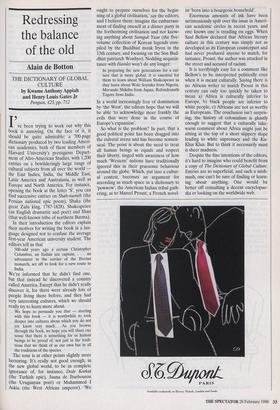Redressing the balance of the old
Alain de Botton
THE DICTIONARY OF GLOBAL CULTURE by Kwame Anthony Appiah and Henry Louis Gates Jr Penguin, US, pp. 712 Ive been trying to work out why this book is annoying. On the face of it, it should be quite admirable: a 700-page dictionary produced by two leading Ameri- can academics, both of them members of Harvard University's prestigious Depart- ment of Afro-American Studies, with 1,200 entries on a bewilderingly large range of cultural subjects from all over the world the East Indies, India, the Middle East, Latin America and Australasia, as well as Europe and North America. For instance, opening the book at the letter 'S', you can find successive entries on Shah-nameh (the Persian national epic poem), Shaka (the great Zulu king, 1787-1828), Shakespeare (an English dramatist and poet) and Shan (that well-known tribe of northern Burma).
In their introduction the editors explain their motives for writing the book in a lan- guage designed not to confuse the average first-year American university student. The editors tell us that
500-odd years ago a certain Christopher Columbus, an Italian sea captain, . . . an adventurer in the service of the Iberian monarch, set off to look for a new route to India.
We're informed that he didn't find one, but that instead he discovered a country called America. Except that he didn't really discover it, for there were already lots of people living there before, and they had very interesting cultures, which we should really try to learn more about.
We hope to persuade you that — starting with this book — it is worthwhile to look deeper into cultures about which you do not yet know very much... As you browse through the book, we hope you will share our sense that there is something for us human beings to be proud of, not just in the tradi- tions that we think of as our own but in all the traditions of the species.
The tone is at other points slightly more hectoring. It's really not good enough, in the new global world, to be in complete ignorance of, for instance, Dede Korkut (the Turkish epic), Juana de Ibarbourou (the Uruguayan poet) or Muhammed I Askia (the West African emperor). 'We ought to prepare ourselves for the begin- ning of a global civilisation,' say the editors, and I believe them: imagine the embarrass- ment of finding oneself at a dinner party in the forthcoming civilisation and not know- ing anything about Samguk Yusa (the five- volume collection of Korean legends com- piled by the Buddhist monk Tryon in the 13th century, and focusing on the Son Bud- dhist patriarch Wonhyo). Nodding acquain- tance with Hamlet won't do any longer:
In preparing the new generations for a cul- ture that is more global, it is essential for them to learn about William Shakespeare as they learn about Wale Soyinka from Nigeria, Murasaki Shikibu from Japan, Rabindranath Tagore from India.
In a world increasingly free of domination by 'the West', the editors hope that we will be able 'to acknowledge more frankly the evils that were done in the course of Europe's expansion'.
So what is the problem? In part, that a good political point has been dragged into the cultural arena and has become nonsen- sical. The point is about the need to treat all human beings as equals and respect their liberty, tinged with awareness of how much 'Western' nations have traditionally ignored this in their gruesome behaviour around the globe. Which, put into a cultur- al context, becomes an argument for according as much space in a dictionary to `powwow', the American Indian tribal gath- ering, as to Marcel Proust, a French novel- ist 'born into a bourgeois household'.
Enormous amounts of ink have been acrimoniously spilt over the issue in Ameri- can academic circles in recent years, and one knows one is treading on eggs. When Saul Bellow declared that African literary culture in this century was simply not as developed as its European counterpart and had never produced anyone to match, for instance, Proust, the author was attacked in the street and accused of racism.
It is terrifyingly easy for a comment like Bellow's to be interpreted politically even when it is meant culturally. Saying there is no African writer to match Proust in this century can only too quickly be taken to mean a) Africa is culturally inferior to Europe, b) black people are inferior to white people, c) Africans are not as worthy as Europeans. The conclusion isn't surpris- ing; the history of colonialism is ghastly enough to suggest that a culturally luke- warm comment about Africa might just be sitting at the top of a short slippery slope leading to white supremacy and the Ku- Klux Klan. But to think it necessarily must is sheer madness.
Despite the fine intentions of the editors, it's hard to imagine who could benefit from a copy of The Dictionary of Global Culture. Entries are so superficial, and such a mish- mash, one can't be sure of finding or learn- ing about anything. One would be better off consulting a decent encyclopae- dia or looking on the worldwide web.


























































 Previous page
Previous page